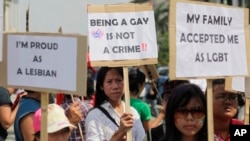Activists in Indonesia are warily celebrating the Constitutional Court's narrow rejection last week of a conservative group's petition to ban gay and extramarital sex.
The surprising 5-4 verdict in the world’s largest Muslim-majority nation came during a long anti-LGBT crackdown that began in January 2016. The ruling, while welcomed by the LGBT community, does not end their battle for acceptance. The Constitutional Court’s decision focused more on the fact that it was the wrong venue to consider such a ban than on the human rights implications.
“I am relieved and feel so happy,” said Lini Zurlia, a gay rights activist in Jakarta after the Constitutional Court’s decision. “But I’m still worried about the next process at the legislative level,” she said. Parliament is expected to consider the ban.
The same day the Constitutional Court ruled, a North Jakarta court sentenced eight gay men to more than two years in prison for taking part in a gay sex party at a sauna, which was recently shut down on the grounds it was the site of sex work. Analysts say the sentences are further evidence of how criminalization continues to affect Indonesia’s LGBT population.
Nebulous pornography law
The major legislation criminalizing LGBT people in Indonesia is not a sodomy law or ban on gay sex, but a vague “pornography law” that has been used to charge everyone from sexters to sex workers to sauna attendees. Just this year, more than 200 LGBT people were arrested under the pornography law. Due to this unchallenged law, the narrow court victory, and the ongoing crackdown, many LGBT Indonesians are on edge once more after the celebratory moment last Thursday.
The eight people charged were among 141 gay men detained at a raid last May on the Atlantis Gym and Sauna, a move that drew criticism from the international human rights community. The men were stripped and faced police questioning while naked. Most were released the next day.
Those charged included a director, strippers, a gym trainer, a receptionist and a security guard, according to the Associated Press. Activists have called the pornography law used to prosecute them a serious incursion into civil liberties.
The law prohibits sex parties and defines “‘deviant sexual acts’ to include: sex with corpses, sex with animals, oral sex, anal sex, lesbian sex, and male homosexual sex,” according to Human Rights Watch. It sometimes intersects with the Electronic Information and Transactions Law, which prohibits exchanging “indecent” material on digital platforms, effectively criminalizing actions like sharing nude photos.
The extremely broad sweep of the laws means they have ensnared Indonesians ranging from the sauna patrons to the prominent hardline Islamist cleric Habib Rizieq Shihab. Authorities put out an arrest warrant for him for allegedly exchanging explicit WhatsApp messages with a woman.
According to a 2013 Pew report, 93 percent of Indonesians believed homosexuality was not acceptable.
Last year, there was an acute “gay panic” in which, among other things, a transgender boarding school was shut down, a former minister called on the public to kill gay people, and the vice president personally attacked a United Nations program focused on LGBT rights.
President Joko “Jokowi” Widodo defended LGBT rights with a statement in October 2016, although he qualified it by saying, “In Indonesia… Islam does not allow [homosexuality].” He has been mostly silent on the issue since then.
“Yes, certainly stigma and discrimination against LGBT continues to exist,” said Christian Supriyadinata of Gaya Dewata, a gay and transgender rights group in Bali. “As long as policy holders and leaders continue to think in terms of norms and morality, the LGBT community will continue to face discrimination. Whereas LGBT has nothing to do with morality. Crimes can be committed by anyone.”
Homosexuality is legal in Indonesia except in the semi-autonomous Aceh province, which observes Sharia, or Islamic law. Two young men were caned in Aceh after a group of vigilantes broke into their home and caught them having sex.







